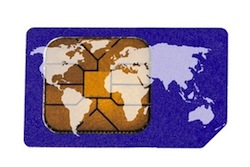GeoSIM has announced a new global M2M data transfer solution that enables customers to be charged a flat rate for each data message that is transmitted, no matter where in the world the device is roaming from.
The new solution, the GeoSIM Global M2M Data System, uses Unstructured Supplementary Service Data (USSD) technology to transmit data in small packets no longer than SMS text messages to the customer’s server in only a few seconds.
A mobile phone signal and one of GeoSIM’s new global SIM cards, which have the ability to roam on over 560 mobile networks in the world that GeoSIM has roaming agreements with, are required for the solution to work.
GeoSIM also provides a platform from which customers can send commands, such as remote configuration, data retrieval and other critical performance functions.
“Whilst some M2M data communication needs are currently being satisfied using SMS and mobile data, our research has shown that traditional GPRS and 3G data connections are unstable and can be hard to establish, particularly in remote areas,” GeoSIM’s managing director Ed Neal told Mobile Europe.
“Problems can also occur if the device is located overseas or if the mobile device is using a foreign network on a roaming basis. This means data delivery is not guaranteed and can mean critical communications are delayed or lost.”
Besides using less power than SMS or GPRS M2M systems, transmitting data this way also takes away roaming charges.
“Traditional M2M SIMs require a GPRS connection. For example, customers could utilise a [country specific] SIM, but if you have a device that is roaming between countries, some M2M SIMs will not work when roaming, or if they do, you get charged an awful lot of money for a GPRS signal,” he said.
“All USSD messages are rooted back through our Home Location Register (HLR) in the UK, which is then forwarded to an internal URL on the customer’s server, so [the solution] can be charged on a per message basis, a pre-defined message basis or unlimited, depending on the customers.
“A lot of M2M stuff is only sending messages once a month, so customers might not want to be tied into a contract.”
The solution is targeted at enterprises keen to use M2M devices.




